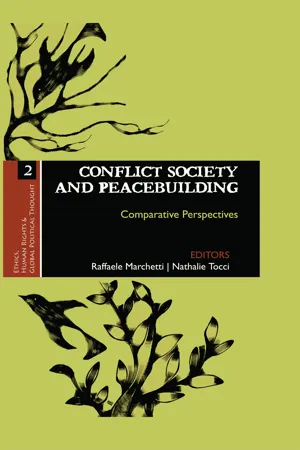
Conflict Society and Peacebuilding
Comparative Perspectives
- 334 pages
- English
- ePUB (mobile friendly)
- Available on iOS & Android
About This Book
Civil society's role in conflict and peace-building is increasingly being recognized: an integral element in conflict, it can act within the conflict dynamic to fuel discord further or to entrench the status quo. Alternatively, it can bring about peaceful resolution and reconciliation. The question at hand is not whether to engage civil society in contexts of conflict, but rather how governmental actors can partner with civil society to induce conflict resolution and conflict transformation. The collection of essays in this volume attempts to explore this nexus between civil society and peace-building, especially in the context of intra-state and identity-driven conflicts, across different regions by focusing on case studies from Asia, Africa, Latin America and Europe.
Frequently asked questions
Information
PART I: THEORETICAL REFLECTIONS
Chapter 1
Conflict Society: Understanding the Role of Civil Society in Conflict*
Civil Society in Context
Conflict Society and Political Identities
Table of contents
- Cover
- Half Title
- Series Page
- Title Page
- Copyright Page
- Contents
- List of Abbreviations
- Acknowledgements
- Civil Society in Conflict and Peace: An Introduction
- PART I: THEORETICAL REFLECTIONS
- PART II: AN ANALYSIS OF INTERNATIONAL CIVIL SOCIETY IN CONFLICTS
- PART III: AN ANALYSIS OF LOCAL CIVIL SOCIETY IN CONFLICTS
- About the Editors
- Notes on Contributors
- Index